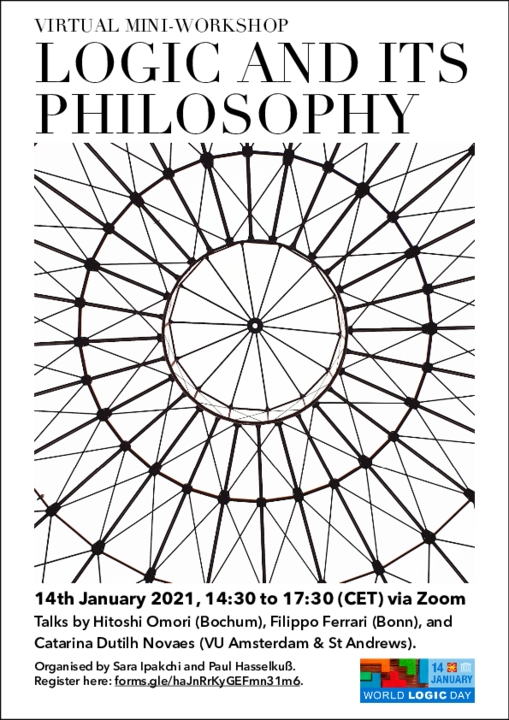On the occasion of UNESCO World Logic Day, a virtual mini-workshop on topics in logic and the philosophy of logic will be held on 14 January 2021 from 14:30 to 17:30 (CET). The event is organised by Sara Ipakchi and Paul Hasselkuß (HHU Düsseldorf).
Speakers & Abstracts
Hitoshi Omori (Bochum): From Aristotle to Wansing
Given a conditional, what does its negation imply? Aristotle’s Theses, i.e. ~(~A→A) and ~(A→~A), can be seen as offering a radical alternative to the more familiar consequences of classical logic and other non-classical logics that are subclassical. Because of its radical nature, there are some tensions between Aristotle's Theses and some of the familiar principles concerning conditionals. In the first half of the talk, a quick overview of discussions on Aristotle’s Theses is followed by a few observations that show the above-mentioned tensions. Building on one of the observations that involves triviality, the second half of the talk begins with a sketch of an approach to Aristotle's Theses proposed by Heinrich Wansing. This will be followed by two generalisations of Wansing's approach. One of the generalisations turns out to offer a unifying perspective on negated conditionals.
Filippo Ferrari (Bonn): The Normativity of Logic and its Significance for the Anti-Exceptionalism Debate
My aim in this talk is twofold. First, I distinguish between six dimensions of anti-exceptionalism about logic and I suggest that two dimensions in particular play a central role in determining what I label 'core anti-exceptionalism'. Second, I scrutinize in what sense(s) logic can be said to be normative (for thought) and I conclude by investigating in what respect(s) and to what extent the normativity of logic poses a challenge to core anti-exceptionalism.
Catarina Dutilh Novaes (VU Amsterdam & St. Andrews): A précis of The Dialogical Roots of Deduction
The Dialogical Roots of Deduction presents a comprehensive account of the concept and practices of deduction, bringing together perspectives from philosophy, history, psychology and cognitive science, and mathematical practice. I draw on all of these perspectives to argue for an overarching conceptualization of deduction as a dialogical practice: deduction has dialogical roots, and these dialogical roots are still largely present both in theories and in practices of deduction. The account also highlights the deeply human and in fact social nature of deduction, as embedded in actual human practices.
Participation
The workshop will take place virtually via Zoom. Participation is free of charge; those interested are asked to register in advance using this form.
If you have any questions, please write to hasselkuss [at] phil.hhu [dot] de or ipakchi [at] phil.hhu [dot] de.


